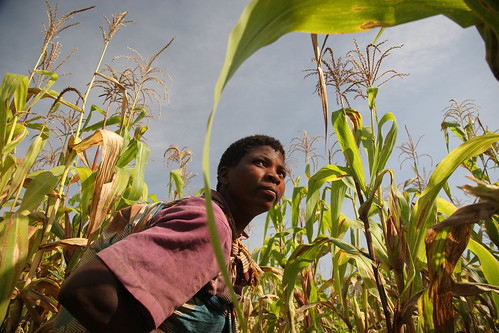Small-scale farmers in sub-Saharan Africa, like this woman in Malawi, will benefit from a US$32 million initiative that is supporting research to boost production of vital food crops (photo credit: ILRI/Mann).
Research funders from the United Kingdom, the United States and government departments from the United Kingdom and India have announced a UK£20 million (US$32 million) joint research initiative to relieve constraints to food production in sub-Saharan Africa and South Asia.
The Sustainable Crop Production Research for International Development program, which was announced on 11 January 2011, will fund research teams from sub-Saharan Africa, South Asia and the UK working to improve the sustainable production of vital food crops. Funding will be awarded to teams that show their research can improve food security and increase crop yields within the next 5 to 10 years.
Food security is a key concern across the world as countries face the challenge of producing and supplying enough safe and nutritious food in sustainable ways for their growing populations. Climate change, urbanization and rising food prices also are reducing access to food by many of the world’s poor people in developing countries.
The program aims to establish mutually beneficial partnerships between researchers in the United Kingdom and developing countries through intellectual collaboration and also to enhance the scientific capabilities of its partners in the South.
A joint multi-national initiative of the UK’s Biotechnology and Biological Sciences Research Council (BBSRC) and Department for International Development, together with the Bill & Melinda Gates Foundation (through a grant to BBSRC) in the USA, the Department of Biotechnology of India’s Ministry of Science and Technology, and the Indian Council of Agricultural Research, the program will focus on research conducted to counter the effects of stresses that are ‘abiotic’—e.g., drought, temperature, salinity, nutrient deficiencies—and/or biotic—e.g., pathogens, pests and weeds in nature—in nature.
The program is offering standard research grants for projects of up to five years led by a principal investigator from any eligible institution. The program is also funding ‘Projects for Emerging Agricultural Research Leaders’, in which some 5–10 grants of up to £2 million in total will be awarded to four-year projects whose principal investigator is an early- to mid-career scientist from a developing country of sub-Saharan Africa or South Asia and employed in a national research program, institute or university.
Successful proposals will focus on biological or biotechnological research and are to be submitted by 31 March 2011.
The Biosciences eastern and central Africa (BecA) Hub, a regionally shared research facility hosted and managed by the International Livestock Research Institute (ILRI) in Nairobi, invites African researchers and scientists interested in exploring use of the Hub for this project to contact Jagger Harvey (crop research and related microbes: j.harvey@cgiar.org) or Rob Skilton (livestock research and related microbes: r.skilton@cgiar.org).
‘I invite African scientists to take advantage of the world-class facilities that BecA offers to participate in this program,’ said Segenet Kelemu, the Director of the BecA Hub. She notes that ‘the Hub is open for use by researchers focused on African agricultural improvement and is an excellent facility for use by those engaged in research initiatives to improve Africa’s food security.’
The BecA Hub provides a common biosciences research platform, research-related services and capacity building opportunities to the region and beyond. The Hub aims to increase access to affordable, world-class research facilities and to create and strengthen human resources in biosciences and related disciplines in Africa.
If you would like to be included in an open-access database of scientists interested in African agricultural improvement—which is managed by the Hub, funded by the Gates Foundation and designed for use by scientists, donor representatives and others—please contact the Hub’s communications officer Jane Hawtin: j.hawtin@cgiar.org. You can also visit the BecA Hub website: http://hub.africabiosciences.org.
____
For more information see
http://www.bbsrc.ac.uk/news/food-security/2011/110111-pr-developing-countries.aspx and http://www.bbsrc.ac.uk/funding/opportunities/2011/1103-sustainable-crop-production-international.aspx

